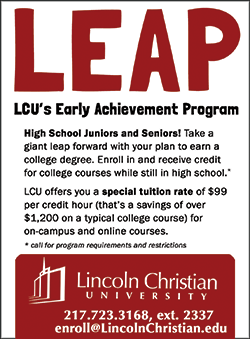|
 “We have had a great deal of success with all three of these
programs,” said Superintendent Robert Bagby. Bagby and other faculty
of LCHS spoke on the effectiveness of the programs. These programs
focus on alternative ways to earn a diploma, recover credits for
graduation, or to provide assistance for incoming freshmen. “We have had a great deal of success with all three of these
programs,” said Superintendent Robert Bagby. Bagby and other faculty
of LCHS spoke on the effectiveness of the programs. These programs
focus on alternative ways to earn a diploma, recover credits for
graduation, or to provide assistance for incoming freshmen.
According to Principal Todd Poelker, LCHS began looking into
alternative education programs about five years ago. Since then,
these programs have met with success. “We even gave a speech a
couple of years ago at the Illinois State Board of Education
conference on them,” said Poelker.
Before LCHS began the alternative diploma program, students with
difficulties in learning due to disciplinary reasons were sent to
Salt Creek Academy. “We weren’t getting the best results,” said
Poelker. Poelker said LCHS wants to work with these students
directly, to see them succeed rather than send them away. He said
the presence of the vocational building on the campus provided a
unique opportunity for an all-day alternative program.
Alternative Diploma
The first program implemented by LCHS was the alternative diploma
program. Students in the alternative diploma program spend most of
the day in the vocational building across the parking lot from the
main building. The program is overseen by teacher Chelsea Smith.
 Poelker said the program was created after the administration saw a
need for better results from students who learn through methods
other than sitting in the classroom. “We needed alternatives for
different students with different learning styles,” he said.
The classes offered as part of this program often fall under
vocational categories. These courses include classes on woodworking,
metalworking, automotive mechanics, areas of construction, and CNA
programs. “The program teaches good career skills,” said Poelker,
who said LCHS wanted to connect to local youth and their interests
in potential careers. “They’re good courses for local kids to
pursue.”
Smith described what the curriculum for these students looks like.
Students may choose between a class day of 8:00 to 2:15 or 9:00 to
3:12. “Their days are one hour shorter than general education
students because we figured general education students get a study
hall and that makes up for it over here,” said Smith.
Classes for the students are then tailored to each student’s needs.
“We have many options of classes for each subject based on
difficulty and skill level. So if a student really struggles with
Math, I will enroll them in one of our lower level math courses,”
said Smith.
A majority of the coursework (English, Math, Science, U.S. History,
Civics, and Consumer Ed) is found online. The coursework is broken
up into five units. Students take a pre-test, and their results will
alter their instructions based; then they will complete vocabulary
lessons, in which students are required to type out each vocabulary
word; then there is a series of instructional videos covering the
relevant material; a quiz over each topic from each instructional
video; and finally a unit test. At the very end of the course is a
comprehensive exam.
“I require that each student complete at least 10-12% each day. I
have a check-in sheet that their progress is checked every 30
minutes to make sure they are completing work and staying on task,”
said Smith.
 In addition to their online coursework, students are required to
enroll in at least one Lincolnland Technical Education Center (LTEC)
class or an elective class. Most elective classes are taken in the
main building, with a few online options. Smith said the students do
this to become familiar with material outside of their online work.
Smith said, “I also started a work study program which allows
student to earn credits for working in the community. Many of my
current students hold jobs in Lincoln and I am in contact with their
employers checking on their progress and making sure they are
attending work on time, completing their jobs, and working well with
co-workers,” said Smith. Poelker added that they waive the physical
education requirement as well.
Due to the differing schedules of different students, LCHS holds a
special ceremony multiple times a year, usually every few months,
for students that graduate from this program. Poelker said these
students bring their families to a small get-together, where the
students can share what they’ve learned. The ceremony is offered at
different times throughout the school year so a student can
immediately take their new skills into the working world.
Poelker said the success of the program has led to parents calling
the school frequently to ask about it. “We have ten or twelve
students on a waiting list,” he said. “Some of the credit recovery
students are waiting for it,” he added, referring to another of the
school’s alternative education programs.
Credit Recovery
The credit recovery program at LCHS is run by teacher Janet Lovdahl;
Lovdahl also works with students in the alternative diploma program.
According to Lovdahl, the program is offered for students who have
fallen behind on earning academic credit. The program is funded by a
Truants Alternative and Optional Education Program (TAOEP) grant
from the state. According to Bagby, the program was started around
five years ago.
[to top of second column] |

Students in this program complete their work in a computer lab, as
like the alternative education students, much of their coursework is
completed online. These students attend their regular classes before
lunch, and then spend the afternoon in an extended study hall.
The credit recovery program is an option for students failing a
class, but that is not the only reason why the school offers the
option. Lovdahl said that while there are fifth-year seniors and
truants who go through the program, there are other reasons why
students are placed in it.
“It’s not always because of failure,” said Lovdahl. As an example,
Lovdahl said that a student who faces a long illness or a surgery
can find themselves out of school for the better part of a semester.
“If you have a student who needs surgery, they could be out for
weeks,” said Lovdahl. As a result, students who find themselves in
medical emergencies can use the credit recovery program to keep up
with their class.
“There are about thirty students who graduate every year who
wouldn’t have graduated on time otherwise,” said Lovdahl. “This
program helps them to graduate with their class.”
These two programs are offered to students enrolled at LCHS who are
struggling for one reason or another with the typical means of
education.
LCHS is now offering a third opportunity; this time for those who
are new to LCHS altogether.
Freshman Academy
The freshman academy program is new to LCHS. It was implemented this
year, and is run by teacher Michelle Hobbs. This program is used to
assist incoming freshmen who need help transitioning to high school.
“Our goal is that they will all be sophomores,” said Hobbs. “We will
make sure they pass as freshman.” Poelker added that the program was
started because they saw a need for something like it. “There were
kids coming in behind, and they need the attention,” said Poelker.
According to Hobbs, these students may need help because of academic
reasons. Hobbs said that for some of the students, attendance was an
issue in eighth grade. While that may have been an issue then, Hobbs
said this year has seen few problems in terms of students being
present in class. “Our attendance for this has worked out great so
far,” said Hobbs.

Currently, there are fifteen students enrolled in the Freshman
Academy, which is their maximum capacity. Hobbs said it could be
larger, but there are space limitations to consider. “We could
double it if we had more space and staff,” said Poelker.
Students spend the day in one classroom, other than lunch and time
in the gym for P.E. Students work with an English teach and a Math
teacher in the morning before P.E. They spend time working on
computers before lunch, including an online Health and Science
course. Finally, they spend fifth, sixth, and seventh period in
study hall.
In addition to this routine, students in the program learn other
important skills, such as social skills or good studying practices,
such as the use of an agenda. Hobbs said that a key to the success
of the program has been a very open line of communication with
parents on the work their students are completing. Hobbs said for
these parents, and for the teachers, “failure is not an option.”
“This program helps these kids to build self-confidence,” said
Hobbs. According to Hobbs, three students have even made the honor
roll after being enrolled in this program. Because of their success
this year, Hobbs said that other parents in similar situations have
called and asked about the program, as have other school districts.
Hobbs and Poelker both said they feel this program has been a
success from the start, and they look forward to the next year.
 |